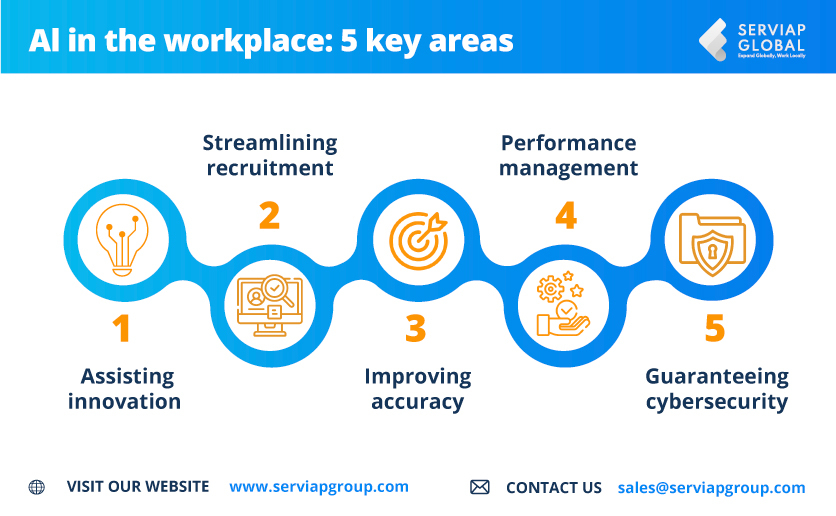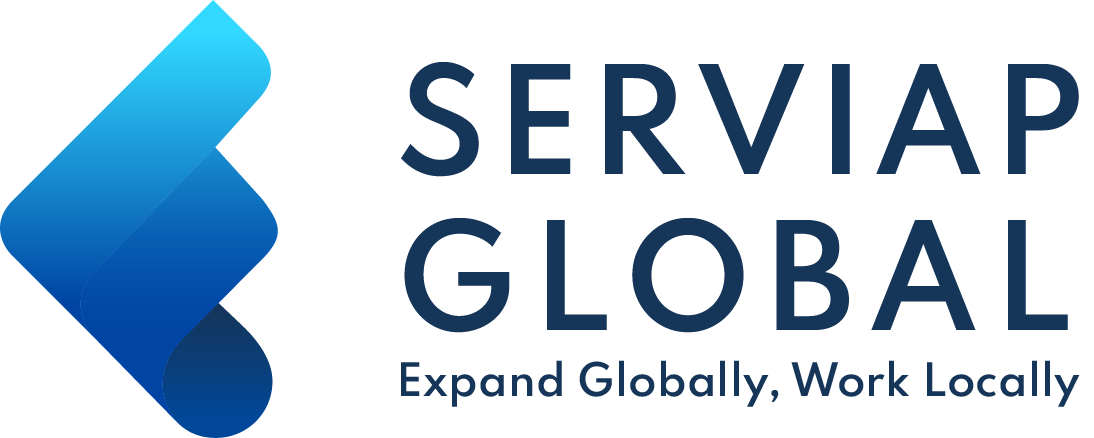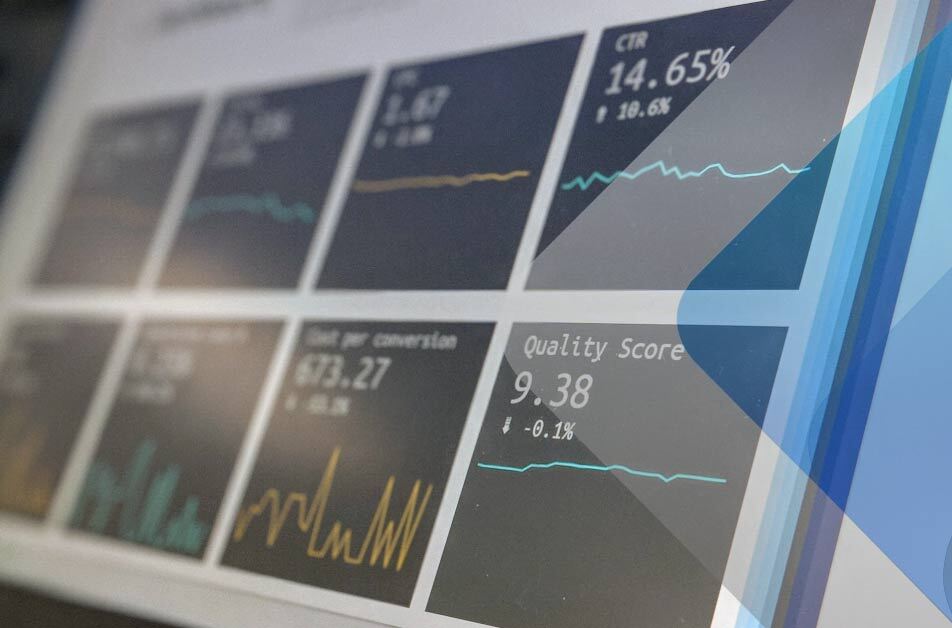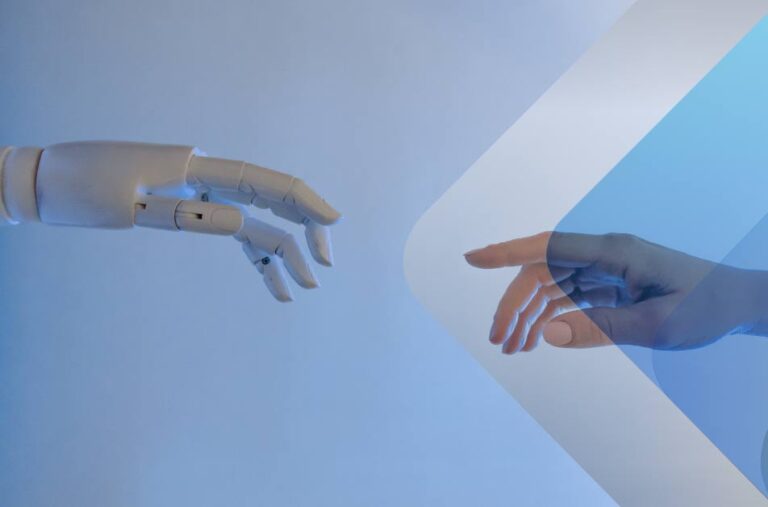Table of Contents
As businesses have adapted to remote and hybrid work on a larger scale, there has also been a rise of new technologies operating with artificial intelligence. Using AI in the workplace has become an increasingly popular option for leaders who want to manage their distributed teams more efficiently.
AI has transformed how companies deal with remote collaborators, as it can seamlessly improve operations and make them more accurate and automated, allowing workers to shift their attention from minor daily tasks to more significant areas.
SEE ALSO: Call center outsourcing: 5 great destinations to consider
It’s important to remember that AI in the workplace does not necessarily mean fewer jobs for people or that technology will simply make professionals obsolete. Instead, it calls for adaptation and offers plenty of new opportunities for growth in the work industry such as using AI recruiting tools.
From virtual assistants to data analytics and cybersecurity, AI technology continues to advance and create new solutions for decision-making, customer experience, and workforce assessment.
The rise of AI in remote and hybrid work
Artificial intelligence (AI) technologies are computer systems that can perform tasks that typically require human expertise. These duties include problem-solving, learning from experience, understanding natural language, recognizing patterns, and making decisions. AI techniques use algorithms and large datasets to analyze information, extract insights, and even make predictions.

AI in the workplace can automate repetitive and time-consuming tasks and quickly process vast amounts of data. So, the rise of AI in remote and hybrid work is not just a temporary reaction, but it’s likely a glance into the future of work. As technology continues to develop, we can expect AI to play an increasingly central role in how we collaborate, and innovate in workteams.
The development of AI has affected diverse industries, including companies with office teams or distributed workforces. But, for remote and hybrid scenarios, AI in the workplace can help us unlock numerous benefits, as it enables more effective information sharing, improves productivity, supports knowledge management, and ensures security and privacy.
It also soothes one big concern of leadership in remote working, which is communication. For instance, AI in the workplace can enhance video conferencing, and personalize project management. It can improve video-adjusting factors and provide features for live transmissions, like real-time transcription, and captioning. AI-driven platforms can create a more interconnected remote workforce.
Al in the workplace: 5 key options
Artificial intelligence can be used in the workplace from the recruitment processes to streamlining daily tasks and helping with expansion. This technology can be used for multiple purposes within a company. Here are some of the most common ones.

1) Assisting with innovation and collaboration
Generative AI tools, such as ChatGPT and Dall-e, have become very popular as they can help humans streamline creative tasks by turning code into realistic content. This has revolutionized the process of content creation and allows remote workers to develop projects entirely from their homes, without having to access professional studios to record video, audio, and so on.
AI in the workplace is also enhancing collaboration tools, making them more intuitive and efficient. Real-time language translation and intelligent content recommendations are some of the ways AI is streamlining communication and partnership among remote teams. Thus, as remote connection becomes easier, this can also improve a team’s wellbeing and innovation rates.
2) Streamlining recruitment
AI programs can help you source professionals, from publicizing job vacancies to selecting candidates and managing communication with them until they are singled out for interviews. This way, recruitment can be more reliable on the candidate’s merits, avoiding human biases. AI-based tools can easily personalize the process according to your hiring needs.
AI in the workplace may also provide valuable data to recruiters, who can use it to reduce risks related to other new hires in the future. Some metrics obtained are candidate engagement, time and cost of hire, as well as employee skills, experience, and preferences. Analyzing this information will help recruiters identify patterns and improve remote and global talent acquisition.
3) Improving daily accuracy

One of the main benefits of AI in the workplace is reducing human error in data analytics. Technology can enhance accuracy when analyzing text or codes, as well as interpreting the data and identifying possible biases in the work that can sometimes get overlooked by human workers. AI can learn using algorithms and automatically flag typos, missing values, and procedural errors.
This can save you time because software is not affected by subjectivity when interpreting data, which can naturally happen with humans. So, for instance, AI-based chatbots can analyze feedback from a customer’s experience and filter what information is important for solving an issue. This way, the manual time needed to complete such tasks can be reduced drastically.
4) Enhancing performance management
For managers, AI in the workplace can improve performance assessment, which can be especially interesting for distributed workforce management. AI makes it easier for leaders to better organize and oversee remote workers’ productivity, which is one of the main concerns for the work-from-home model. They can use software such as Timely to automate time tracking and get precise daily records.
Additionally, there are also AI tools that can send alerts when an employee doesn’t log into their workstation at the right time or doesn’t complete certain tasks. This allows managers to get involved and solve issues before they get out of hand. With AI in the workplace, technology can help you ensure that your colleagues are fulfilling their responsibilities.
5) Guaranteeing cybersecurity
The shift to remote work opens up new safety challenges because it can more frequently involve ransomware, unsecure Wi-Fi connections, and file or password leaks. Thankfully, AI in the workplace can help prevent cyber threats. Algorithms can analyze anomalies in network traffic, protecting sensitive information and maintaining a secure remote work environment.
Furthermore, artificial intelligence can employ data encryption and implement regulations to protect confidential information. This is especially important for sectors dealing with sensitive data, like finance and healthcare. AI can guarantee that remote employees will still be able to securely access and exchange corporate assets, without compromising the system.
Serviap Global assists you with distributed workforce
At Serviap Global, we support many companies using remotely distributed workforces. We offer international PEO / EOR services and contractor hiring in over 100 countries worldwide.
We can help you develop your global expansion strategy and administer international professionals, without you needing to set up a local entity or worry about unfamiliar regulations.
Contact us to learn how we can help you with your remote or hybrid workforce.





